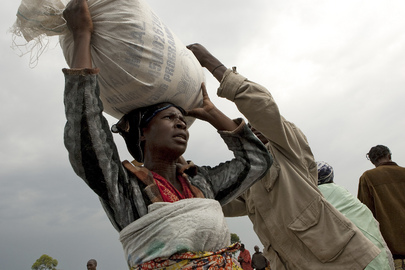The effects of the production and the use of agrofuels on human rights: the right to food

When the interests for agrofuels widely prevail on food wants, taking off lands from food crops the right to food is affected and in many cases threatened.
Especially in developing countries the 'conversion of foods in agrofuels' determines that people, depending on land for their livelihoods, were cut off from access to land, without suitable alternatives, and in many cases, they were unable to have access to food because of the lack of resources or their conditions of marginalisation. In 2009, the Advisory Committee of the Human Rights Council recognised the conversion of staple foods into agrofuels, inter alia, as a cause of the current food crisis.
The High Level Conference on World Food Security of the Food and Agriculture Organization (FAO) held in Rome in June 2008 has stressed the challenges of agroenergy on the four dimensions of food security: availability, access, stability and utilization.
- The availability is threatened by the competition for natural resources that the expansion of agroenergy crops created: "...[l]and, water and other productive resources are diverted from food production to biofuels production", diminishing the people's capability to produce goods and to meet basic needs for living. Many lands considered 'marginal' or 'under-exploited' are
thebest to be converted in agrofuels plantations: subsistence agriculture or small farmers' activities cannot stand in comparison with high yield huge plantations. But consequences at the social and at the environmental level are the most severe. If we speak about indigenous peoples, the situation gets even worse: their lands are very often the richest and therefore suitable for agriculture (or forests that are razed to the ground to make available farming land) but the evictions of these groups from their lands have a devastating effect on their cultural and social identity, which has already determined the disappearance of entire ethnic groups or their communities and has swollen the ranks of poor and marginalised peoples in the cities. Moreover, certain methods and practices usually performed in monocropping such as the indiscriminate use of pesticides or GMOs, and the following pollution and environmental degradation make the pressure on natural resources heavier. - The access to food refers to the "people's economic ability to access food as well as their ability to overcome barriers that stem from physical remoteness, social marginalisation or discrimination". The agrofuels market is strictly linked to the agricultural industry, and the competition for land and resources stresses food prices provoking their increase even if feedstock are not produced on converted food crops. In particular, referring to the food crisis in 2008, the study of Donald Mitchell highlights that: while the combination of higher energy prices and related increases in fertilizer prices and transport costs, and dollar weakness explained the 25-30% of the total food price increase between January 2002 and June 2008, "most of the remaining 70-75 percent increase in food commodities prices was due to biofuels and the related consequences of low grain stocks, large land use shifts, speculative activity and export bans."
- The stability of food supplies represents the third dimension of food security and refers to the rate of vulnerability to losing access to resources and livelihoods following conflicts, environmental degradation, economic crisis, etc. The current conditions of agrofuels production accentuate the causes of instability including the volatility of food prices and the import dependence of developing countries.
- The utilization concerns the concrete possibility of people to feed themselves in an adequate way and in sufficient quantity, according to health and nutrition factors which include also access to clean water, sanitation and medical services. The intensive consumption of water for agrofuels irrigation and processing makes water sources more scarce. Further, the enforced evictions and displacements by reason of the settlement of monocropping plantations constraint farmers and indigenous peoples in inhuman conditions in which they cannot meet their basic needs.
The 2000 UN Special Rapporteur on the right to food, Jean Ziegler, noted that the current production of goods for food is able to feed 12 billion people, but the diversion of cereal crops to agro-energy production decreases the availability of food for human consumption. Thus, the main obstacles to the full and progressive realisation of the right to food is not due to a lack of food that drives hunger, but rather to political decisions such as the diversion of harvest on agroenergy scope. Jean Ziegler, in the light of the fact that over 854 million people are chronically undernourished, has called for a five year international moratorium on agrofuels.
In the immediate aftermath of Russia’s invasion of Ukraine, global grain and vegetable oil prices reached record highs. The World Food Programme has warned that the rising prices of these staples, which has been driven by a combination of the Covid pandemic, climate breakdown and the war in Ukraine, is generating a food crisis around the world. Despite the looming risk of food shortages that could push hundreds of millions of people into food poverty, Europe continues to turn 10,000 tonnes of wheat into ethanol for use in cars. Reducing the use of wheat in EU biofuels to zero would compensate for over 20% of the total wheat exports of Ukraine and support food security in other countries depending on Ukrainian wheat supplies.

